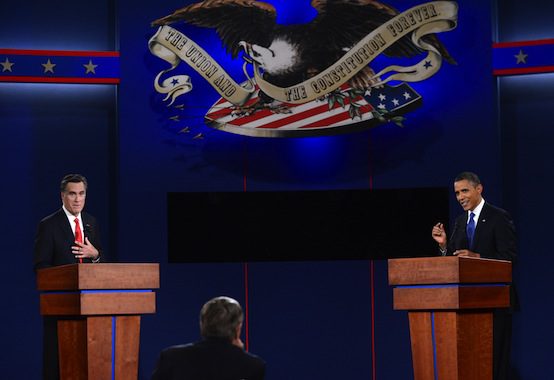The First Presidential Debate: A Choice or an Echo?

I tried to live-blog this thing, but just didn’t have the energy. So here is my strongest impression of the debate overall: Mitt Romney wants the audience to believe that he and Barack Obama disagree profoundly on fundamental philosophy, but disagree only very marginally about policy.
Over and over again, Mitt Romney would attack the President on general principles, then the President would say, in so many words, “well, the implications of that view are” and start listing policy implications, and Romney would retort: no, I don’t believe any of that, in fact that stuff you say I oppose is stuff I agree with, and that stuff you say I support is stuff I absolutely will not do.
On the budget, Romney praised Bowles-Simpson, which called for a substantial net increase in revenue, suggesting his own plan was a variation on that theme, and denied he would cut spending in any specific area that Obama highlighted as a possibility that he might cut – the only spending he talked about was spending he promised to increase: increases on defense, restoring cuts to Medicare, etc.
On health care, he repeatedly talked up his reform in Massachusetts, and when asked how it was distinguished from Obamacare, said it was a state-level plan that was enacted on a bi-partisan basis – an entirely process-related answer. Any time Obama talked about anything popular in Obamacare – like the way it handles pre-existing conditions – Romney said, effectively: don’t worry, I’ve got that covered in my plan as well.
On Wall Street regulation, Romney was at pains to reassure that he believed in regulation, and that there were plenty of sensible things in Dodd-Frank, and the one line that he called out as being a problem was the “too big to fail” designation (without explaining what that was, or how it was related to the regulation as a whole, or how he’d deal with the actual problem of too-big-to-fail).
On education, Romney was eager to say that Secretary Duncan had good ideas that he agreed with and would build on, and that he would not roll back the Federal role (but would use Federal leverage to promote school choice).
Even on taxes, the clearest point of contrast, Romney denied he intended to reduce the tax burden on the wealthy, denied he would increase taxes on the middle class, and denied he would increase the deficit. His tax cut was reduced to a “goal” of reducing rates and broadening the base, which would come out of a process that would involve both parties.
And on it went in that vein.
The President was plainly frustrated by this approach, and his frustration showed. If, as they say, you watched it without sound – or, even better, if you didn’t speak English, so you could hear the sound but couldn’t understand the words – I have to believe Romney won by a mile.
But if you didn’t watch the debate, and read the transcript, what you’d see is the following. When Romney attacked, Obama generally had a policy response – some more persuasive than others, but the response was generally policy-related. When Obama attacked, Romney would generally deny that he took the position that was being attacked.
Romney’s palpable zest for the debate made him look like a guy ready to take charge, and the President’s demeanor suggested some willingness to let him do so. But his refusal to stand his ground on anything – and the marked contrast with the President in that regard – made him sound like a snake-oil salesman.
I guess it’s clear how the combination played for me. How it played for a low-information voter, I don’t know.
Comments